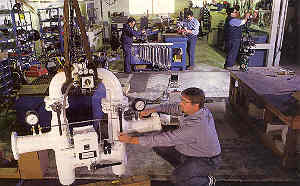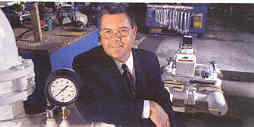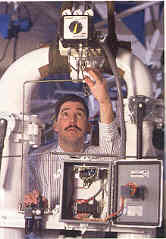
"The era of the commodity valve is coming to an end," he says. "Distributors that carry bulk items in steel, bronze or iron are going to see their margins cut and more competition from imports."
Valve manufacturers producing lines that are suitable for upgrading, such as Jamesbury, Neles or Keystone, are doing very well even in such a competitive market, Beschloss points out.
"We're heading for some very troubled waters that we can't begin to understand today," he adds. "The niche player is the one who's going to survive the next five years."
Customer service is usually the focus of any company's attempts to differentiate itself from its competitors. PVF distributors are often inclined to take the high-tech approach to that focus. So high-tech, in fact, that many have set up separate departments or even distinct companies to handle the highly engineered products they provide to their clients. Valve actuation at these firms has definitely progressed beyond a worktable in the back corner of the warehouse.
Allied Supply, now a part of Ferguson Enterprises, made the decision more than six years ago to take an aggressive approach to valve actuation. Like many others, Allied started out with that guy at a workbench in the corner, but after the company acquired a 10,000-sq.ft. building adjacent to its main facility, brothers and then-owners Chuck and Steve Smith decided to put the space to better use than just more storage. Thus Allied Systems was born.
"Allied Systems is separate from Allied Supply, so when customers call, they know they're talking to a company that specializes in what they need," Chuck Smith explains. "It's not just part of a warehouse. Allied Systems has 11 employees dedicated to that part of our business. It has helped us stay focused on our goal of solving problems for our customers."

Engineering for the re-engineered
With the financial climate of the last decade or so, many of the process companies that comprise the bulk of many PVF distributors' customer base have been through "re-engineering." As a result, these firms have fewer people to operate valves, but the valves still have to be operated. Typically these companies turn to automation to solve the problem, Beschloss notes."You can either do the work in-house or give it to somebody else," he says. In-house automation means either hiring the technical personnel necessary for these sophisticated projects or training existing employees to handle them - both expensive options. So the customer turns to the "somebody else" - often the distributor.
Furthermore, providing this kind of service gives distributors a foot in the door for other kinds of PVF materials, adds Gary Eichman, director of Allied Systems. For example, his division has expanded into other engineered products to serve its actuation markets: primarily food and beverage, with a generous share of municipal waterworks and original equipment manufacturers. To wrap up the package, Allied Systems also does some custom fabrication. Eichman likes to think of his business as one-stop shopping, with salespeople from Allied Systems and Allied Supply double-teaming prospective jobs.
"We've taken on the Chesterton line of pumps, mechanical seals and packing and hired a specialist for that," Eichman says. "So when he's calling on customers for mechanical seals and pumps, he can pull Allied Supply into their other commodity-PVF needs. The Allied Supply sales reps do the same to bring new business to Allied Systems. It has provided some major opportunities for us.
"We can be our customers' single source for everything from below-ground all the way to top of the tower with anything piping-related: actuation, instrumentation or any technical product line. Our accounts are looking for problem solvers. The fact that we can do that for them adds credibility to the whole company."
Service plus
On the other side of the country, Burlington, Mass.-based F.W. Webb took a different route to an automation division. Webb acquired Kentrol when it bought Kentrol's parent, Kennebec Supply Co. Kentrol, started in 1983 as a subsidiary of Kennebec Supply, now has three locations: Winslow, Maine; at the former F.W. Webb automation facility in Warwick, R.I.; and at Webb's Queensbury, N.Y., site.Webb itself has been doing some actuation since 1963, says Jay O'Coin, general manager for the Kentrol division. He attributes the decision to provide this service to tighter specifications in the paper-making process, which dominates the PVF market in New England and upstate New York.
"The only way you can meet those specifications is with computers," he explains. "Actuation has really caught on in the last six years."
As a full-service industrial process control system provider, Kentrol supplies throttling controls with modulating control valves and computer interfacing, as well as. more common automated on/off valves. "We're a systems-integration house with a full line of instrumentation," O'Coin says.
Along with new ownership when Webb bought Kentrol last year, Kentrol has gained "instant access" to parts of companies its sales reps couldn't reach before. And the reverse is also true, O'Coin points out.
"A lot of the products Webb sold were geared toward the mechanical end of the business," he says. "With the acquisition of Kentrol, it got into the automated side: the instrumentation and the electrical. In years past, customers often would buy a number of components of a control system and put it together themselves. Now they rely on us as a subcontractor to do that for them: build skids and panels, pipe them up and wire them. They're looking for a process-control solutions provider."
Like Allied Systems' partnership with Allied Supply, Kentrol expects to significantly expand sales and service through its relationship with F.W. Webb. "The biggest challenge we have right now is to take advantage of the full strength of EW. Webb," O'Coin says. "Webb has so many feet on the street already. I have to get my message out to Webb's 35 industrial salesmen about what we do - to stay in touch with them and piggy-back on their leads."
O'Coin also appreciates the diversification that Webb offers. With the current downturn in the paper industry, which he says is "pretty much the only show in town in Maine and New Hampshire," Kentrol has pushed further into the pharmaceutical and chemical markets. "They aren't on the same cycle as the paper industry. The diversification has been good for us."

Niche rich
Pande, a wholly owned subsidiary of Houston-based Piping & Equipment, represents another variation on the actuator/distributor theme. At the Mobile, Ala., branch of P&E, General Manager Mike Williams and his staff already had been actuating valves for 10 years when they were approached by valve manufacturer Jamesbury in 1989. Jamesbury had recently merged with Neles and wanted to set up a manufacturers rep agency to handle its products. And Jamesbury wanted Williams and his team to be that agency."As long as we already had the shop and the trained personnel to do the assembly, we decided we might as well put all the actuation and all the automated product under the reps," Williams recalls. "We started out with three people and made more than $800,000 in sales the first year."
In the ensuing decade, Pande has developed what Williams calls "a stateof-the-art modulating-valve assembly and actuation facility." Williams believes that as a stocking rep, Pande can offer better customer service. The firm recently spent $40,000 on equipment to modify or manufacture brackets for customers that can't wait for an order from a manufacturer.
Where is valve actuation headed? Certainly not toward obsolescence, agree Smith, Eichman, O'Coin and Williams. As outsourcing becomes more popular among their customers, they expect an expansion of the services they offer. It's just plain easier and cheaper - for a manufacturer-customer to let the distributor handle as much MRO work as possible, especially with specialized products or problems. Williams reports that Pande is handling an increasing amount of equipment used for hazardous materials.
"Cleaning and repairing those valves at the customer's site means you can flush everything down the customer's pipes. More companies want to keep those valves on-site," he says. "We see a lot of opportunities to rebuild the valves on-site, which limits our liability for the hazardous materials."
Allied Systems' Eichman concurs. "We're more than just an automation house, and that has helped us to grow."
